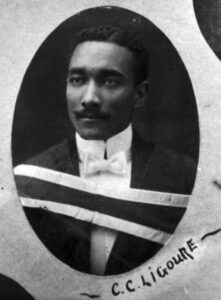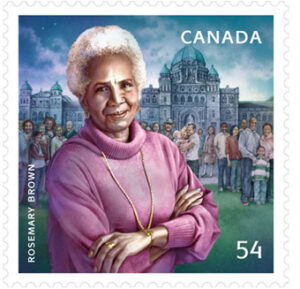
Rediscovering Black History – Spotlighting Stories of Black Canadians
African Ancestral Acknowledgment: We pay tribute to our ancestors of African origin and descent. We treasure the memory of our ancestors and the anticipation of truth, reparative justice, and reconciliation. We celebrate Black history with pride as we acknowledge its importance to all Canadians and Canadian society, as we rediscover the lost stories of excellence, resilience and trauma, and give visibility to people and organizations implementing sustainable change. We acknowledge the historical adversities we have endured and its intergenerational impact on Black communities in Canada. We unite to ensure that our communities are treated with respect, dignity and fairness in all spaces. My humanity is bound up in yours, for we can only be human together.
Every February, we commemorate Black History Month as a time to reflect on the centuries of brutality, pain, and adversities that Black people have and continue to face, as well as the advances made to reduce the presence of anti-Black racism in our society. This month, and every month of the year, we must commit to learning how to advocate for change, with the ultimate goal of creating better futures for Black communities.
This year, the theme for Black History Month in Canada is “Black Excellence: A Heritage to Celebrate; a Future to Build.” This means recognizing and celebrating the significant contributions and stories of Black Canadians, both throughout history and in the present day. Although it may sound simple and essential to pay tribute to these individuals and their contributions, it is important to recognize that this history is not something that has always been prioritized in our societies, let alone workplaces and schools.
This blog post highlights some of the Black Canadian individuals, contributions, and events that have all played a part in shaping Canada as we know it today.
Canada’s History: Notable Black Canadian Civil Rights Activists
In thinking about activists who have been championing the work to not only find a seat at the table, but primarily amplify Black voices to ensure they are both heard and understood – we often think about individuals like Viola Desmond, Mary Ann Shadd, and Dudley Laws. To me, these names are well deserving of their attention because each of them has played a part in getting Black communities just a little bit closer to achieving equity. In the same breath, there are many other Black Canadian Civil Rights Activists whose names and stories are not as well known; two of which will be spotlighted in this blog.
Dr. Clement Courtenay Ligoure
The history of anti-Black racism in the medical field dates back further than anyone would like to acknowledge, which is apparent in Dr. Clement Courtenay Ligoure’s story.
Many websites will tell you that Ligoure was the first Black medical officer for the No. 2 Construction Battalion. (For those of us who may not know, this Battalion was created as a segregated unit comprised of Black volunteers who were rejected from the Canadian Expeditionary Force battalions, all of whom wanted and sought the opportunity to enlist in World War I and II.) However, Ligoure was denied this position for being exactly as he was – Black.
After receiving his Bachelor’s and Doctorate of Medicine at Queen’s University, and being rejected from the medical officer position with the Battalion, Dr. Clement Courtenay Ligoure became the first Black physician to practice in Nova Scotia. Of course, it could never just be that easy. Regardless of his credentials and expertise, Ligoure was denied the ability to practice medicine in any hospital. Instead of admitting defeat, he established a private clinic that resided in his Halifax home, which he later named “Amanda Private Hospital,” after his mother. In this clinic, he offered free medical attention to victims of the Halifax Explosion, where he treated hundreds of patients.
Ligoure’s mindset puts meaning behind what resilience has to look like when the world denies you acceptance to do the things you love and excel at, solely due to the color of your skin. In his time, he may not have been recognized or appreciated for his contributions, which is more the reason why his name should be added to the list of Black Canadian activists we speak about so often.

Rosemary Brown
Immigrating from Jamaica in 1950, Rosemary Brown made significant marks in advancing opportunities and visibility to both Black rights and women’s rights across Canada.
In 1972, Brown became the first Black woman who was elected to a provincial legislature in Canada, as a New Democratic Party (NDP) candidate. Brown was a Member of the Legislative Assembly (MLA) for 14 years, using her time to dismantle the sexism that was so deeply rooted in British Columbia’s education system. It’s safe to assume that being the “first” in any space can be overwhelming and intimidating. But, when we consider the added layer of challenging the norms and breaking down barriers, we begin to identify the gravity of the path that Brown paved for herself and others to follow.
A few years after becoming a member, Brown also ran for federal NDP leadership, using the strong and noteworthy slogan “Brown is Beautiful.” In her convention speech, Brown said: “As my time is running out, to the one million children in this country who are starving; to the workers in this country who share dignity and pride because they know we grow and are strong because of their labor; to the women of this country through whose strength and support and encouragement I have had the guts to stand before you today; and to all of you I say if elected leader I will be unbending in my stand against any form of oppression that crushes people and prevents them from realizing the fulfillment of their life.”

Although the term ‘Intersectionality’ was coined by Kimberlé Crenshaw, individuals like Rosemary Brown have been advocating for intersectional experiences since long before we knew there was a term for it. Overall, Brown’s dedication to advancing equity and equality in the political sphere exemplifies the magnitude of her achievements and contributions as a Black woman in Canada’s history.
Black Canadian Activists Today
Creating a future where Black lives are recognized and respected requires us to look at the stories behind us, while making space for the stories right in front of us. We must note that the activists of today may not be where they are if not for the activists of the past, so in celebrating the individuals who are fighting against anti-Black racism today, we are also paying tribute to the individuals who have fought for these moments throughout Black history in Canada.
Janaya Khan and Sandy Hudson
Many assume that the Black Lives Matter movement exists solely in the U.S. However, harm, violence and discrimination against Black people is also prevalent in Canada. In recognition of the need for Canadians to pursue this movement, Janaya Khan and Sandy Hudson created Black Lives Matter Canada in 2014. While they work together to promote this movement, they are also active advocates in other areas of their lives.
Sandy Hudson is also the co-founder of the Black Legal Action Centre, a not-for-profit community legal clinic that provides free legal services to support individuals in combatting individual and systemic anti-Black racism. Hudson continues to advocate for the rights of Black people in politics, arts, education, and society at large.
Janaya Khan works at an organization known as “Color of Change,” where they lead campaigns that strive to challenge injustices against Black people in corporations and government. In the spirit of intersectionality, Khan is a fierce advocate for Black, queer, and gender non-conforming communities.

Dr. Christopher Morgan
Recognizing the stigma around health and wellness in the Black community, it is vital that we continue to provide spaces where Black people feel safe to have their needs cared for, with cultural awareness and sensitivity in mind.
Dr. Christopher Morgan founded the Black Health Alliance (BHA) in 2000; a community-based organization that aims to reduce racial disparities and promote well-being for Black Canadians. Over the years, this organization has grown to establish the TAIBU Community Health Centre, create a forum for the Black community to discuss mental health challenges, and design initiatives specifically for Black youth.
One of the Alliance’s top organizational values is Afrocentricity, a term coined by Molefi Kete Asante. The concept of Afrocentrism highlights the need for “people of African descent to develop an appreciation of the achievements of traditional African civilizations, and to articulate their history and their own system of values.”
In efforts to decolonize the practices of health and wellness, as well as to center Black experiences, the BHA has and continues to make strides toward creating safer environments within the health industry for Black Canadians. Although Morgan is no longer an active participant in the BHA, his initial idea and passion are in part what has led to their success today.

Bringing Allyship Beyond Black History Month
If you are to take one thing away from this blog, it’s that advancing Black activism doesn’t mean reading the same stories and engaging in the same events every February. What it does mean, is educating yourself on stories and events you’ve never heard or taken part in. This will help you to dive deeper into your understanding of Black history, to develop a more critical lens on ways to reduce anti-Black racism and create better futures for the Black people around you. I’ll leave you with some considerations for individual reflection:
- How do my language and behavior contribute to a culture of anti-Black racism?
- In what ways can I ensure that my actions are aligned with evolving understandings of anti-Black racism?
- In what ways can I use my privilege and influence to amplify Black voices and concerns?
- How can I ensure that my commitment to creating better futures for Black people is sustained over the long term?

